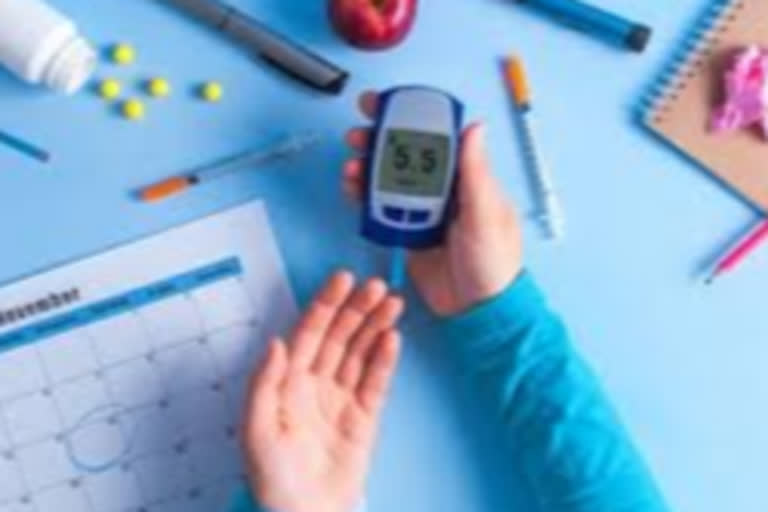Hyderabad: COVID-19 impacts each one of us in the country including the millions with diabetes. India is home to 70 million people with diabetes. If we assume a family size of 5 people in India, it means that 350 million people are affected by diabetes directly or indirectly. In addition to other factors which affect diabetes, stress and anxiety can be a spoilsport for people with diabetes and their families.
People with diabetes are at the SAME risk as anybody else in the country of getting infected with the corona virus. However, if people with diabetes get COVID-19 disease, the risk of serious complications is much higher than others without diabetes as coronavirus can cause more severe symptoms and complications in people with diabetes.
This has been seen in the other countries where the pandemic spread first. The risk of serious complications is much higher among all people with diabetes and the risk is highest among those who have diabetes and are aged 60 years or more.
When a person with diabetes gets infected with the corona virus, blood sugar control gets affected. The person’s body will work overtime to fight the virus infection, which can result in fluctuating blood sugar highs and lows. We know that diabetes affects all organs in the body, and poor control leads to worsening of problems with eyes, feet, kidneys and other parts of the body.
Therefore, people with diabetes must be more careful and follow the advice given for prevention of COVID-19 more strictly than everybody else. Because of the lockdown, people with diabetes are unable to go for their daily walks and exercise which they may have normally engaged in. Keeping a watch on a diet becomes more difficult as one has to make do with what is available with the local grocer.
All people with diabetes depend on their daily medications in addition to other aspects of their diabetic management. People may be concerned if their medicine stocks are depleting and whether the specific brands that they used are not available with the local chemist.
Read: How to counter mental health issues during lockdown
What should people with diabetes do?
1. Strictly enforce the ‘stay-at-home’ policy. Follow the physical distance guidelines of 1-2 metres and see that those who come to visit you maintain this safe distance. Even if medicines or groceries are to be procured sending another family member or a neighbour or the security guard to get them is better.
2. Ensure that not only the person with diabetes but everybody else at home follows the hand hygiene protocol and wash hands with soap and water frequently.
3. All medicines that were being taken earlier MUST be continued. Do not discontinue or reduce the dosage on your own because of the altered situation. If you are taking any other medicines like BP reducing medicines, aspirin etc. continue to take them at the same dose as before.
4. Keep a stock of your diabetes medicines for 3-4 weeks so that you don’t run out of your essential medicines for diabetes control.
5. Keep a watch on your medicine stock and when you are down to a week’s supply, arrange to get your fresh stock. During the lockdown, the specific brand of medicines like insulin or metformin may not be available. Talk to your regular chemist and ask them what alternatives are available. Phone your physician to ask which alternative you can use. Remember that it is important to take your diabetes control medicines regularly even if a different brand has to be purchased.
6. Your diet should be the same as before. Eating small amounts at frequent intervals is better than three meals a day. You should drink plenty of water as it is getting warmer and drier with the changing weather.
7. If you routinely check your blood sugar at home, continue to do so. You may have to check more frequently as you are not doing your regular physical activity.
8. Be aware of the signs of increased sugar levels (hyperglycaemia), which include passing more urine than normal (especially at night), being very thirsty, headaches, tiredness and lethargy.
9. You should not go to a hospital or clinic for your regular diabetic check-ups or any pending investigations. This can wait till you are told that it is safe for you to go out.
10. Being home-bound does not mean you should stop your daily exercise. You may not be able to go out for the evening walk but nothing stops you from walking inside the house. Walking 400-500 steps 4 times a day will be equivalent to 1.5-2.0 kilometres. Stretching and bending exercises can be done. Do not sit in one place for long. Get up and walk around after 45-60 minutes of sitting. Even while sitting rotate your feet and hands to reduce stiffness.
11. Participate in all social activities at home with children, grandchildren or your own peers. This could be playing card games or board games like carom, ludo, snakes and ladders etc. Anything that keeps the family engaged including anecdotal stories and family gossip can be entertaining!
12. If somebody in the house is suspected or proven to have COVID-19, see that they are isolated from you and all the others at home.
Remember, people with diabetes have the same risk of getting infected but being smart by following all advice on prevention is critical to keep you Covid-free.
The author, Dr GVS Murthy is the director, Indian Institute of Public Health, Hyderabad



